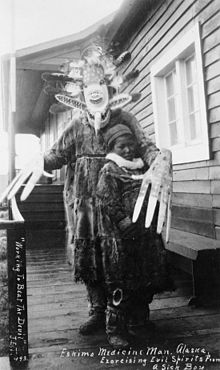- Medicine man
-
This article is about the Native American healers. For the American film, see Medicine Man (film).
"Medicine man" or "Medicine woman" are English terms used to describe traditional healers and spiritual leaders among Native American and other indigenous or aboriginal peoples. Anthropologists tend to prefer the term "shaman," a specific term for a spiritual mediator from the Tungusic peoples of Siberia.[2]
Contents
The medicine man and woman in North America
Role in native society
The primary function of these "medicine elders" (who are not always male) is to secure the help of the spirit world, including the Great Spirit (Wakan Tanka in the language of the Lakota Sioux), for the benefit of the entire community.
Sometimes the help sought may be for the sake of healing disease, sometimes it may be for the sake of healing the psyche, sometimes the goal is to promote harmony between human groups or between humans & nature. So the term "medicine man/woman" is not entirely inappropriate, but it greatly oversimplifies and also skews the depiction of the people whose role in society complements that of the chief. These people are not the Native American equivalent of the Chinese "barefoot doctors", herbalists, nor of the emergency medical technicians who ride rescue vehicles.
To be recognized as the one who performs this function of bridging between the natural world and the spiritual world for the benefit of the community, an individual must be validated in his role by that community. Medicine men and women study through a medicine society or from a single teacher.
Cultural context
 An Ojibwa medicine man preparing an herbal remedy.
An Ojibwa medicine man preparing an herbal remedy.
The term "medicine people" is commonly used in Native American communities, for example, when Arwen Nuttall (Cherokee) of the National Museum of the American Indian writes, "The knowledge possessed by medicine people is privileged, and it often remains in particular families."[3]
Native Americans tend to be quite reluctant to discuss issues about medicine or medicine people with non-Indians. In some cultures, the people will not even discuss these matters with Indians from other tribes. In most tribes medicine elders are not expected to advertise or introduce themselves as such. As Nuttall writes, "An inquiry to a Native person about religious beliefs or ceremonies is often viewed with suspicion.[3] One example of this was the Apache medicine cord or Izze-kloth, whose purpose and use by Apache medicine elders was a mystery to nineteenth century ethnologists because "the Apache look upon these cords as so sacred that strangers are not allowed to see them, much less handle them or talk about them."[4]
The 1954 version of Webster's New World Dictionary of the American Language, reflects the poorly grounded perceptions of the people whose use of the term effectively defined it for the people of that time: "a man supposed to have supernatural powers of curing disease and controlling spirits." In effect, such definitions were not explanations of what these "medicine people" were to their own communities, but instead reported on the consensus of socially and psychologically remote observers when they tried to categorize these individuals.[citation needed] The term "medicine man/woman," like the term "shaman", has been criticized by Native Americans, as well as other specialists in the fields of religion and anthropology.
The term "medicine man/woman" was also frequently used by Europeans to refer to African traditional healers, also known as "witch doctors" or "fetish men/women".
See also
- Curandero
- Ethnobotany
- Herbalism
- Keewaydinoquay Peschel
- Kallawaya
- Midewiwin
- Plastic shaman
- Prehistoric medicine
- Shamanism
- Trance
- Kennekuk
References
- ^ Fienup-Riordan, Ann. (1994). Boundaries & Passages: Rule and Ritual in Yup'ik Eskimo Oral Tradition. Norman, OK: University of Oklahoma Press, p. 206.) Nushagak, located on Nushagak Bay of the Bering Sea in southwest Alaska, is part of the territory of the Yup'ik, speakers of the Central Alaskan Yup'ik language.
- ^ Smith, C. R. "Shamanism." Cabrillo College. (retrieved 28 June 2011)
- ^ a b National Museum of the American Indian. Do All Indians Live in Tipis? Washington DC: Smithsonian Institution, 2007. ISBN 978-0-06-115301-3.
- ^ Smithsonian Institution, Bureau of American Ethnology, Annual report of the Bureau of American Ethnology to the secretary of the Smithsonian Institution, Issue 9, Government Printing Office, United States Government, 1892, http://books.google.com/books?id=C5MqAAAAMAAJ, "... There is probably no more mysterious or interesting portion of the religious or 'medicinal' equipment of the Apache Indian, whether he be medicine-man or simply a member of the laity, than the 'izze-kloth' or medicine cord ... the Apache look upon these cords as so sacred that strangers are not allowed to see them, much less handle them or talk about them ..."
Traditional medicine East Asian 
South & Southeast
AsianMediterranean &
Near EasternAfrican Americas Australasia & Oceania General Categories:- Healthcare occupations
- Religious occupations of the indigenous peoples of North America
- Shamanism of the Americas
- Herbalism
Wikimedia Foundation. 2010.

